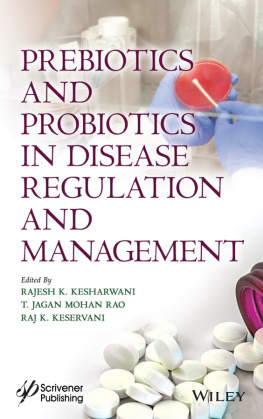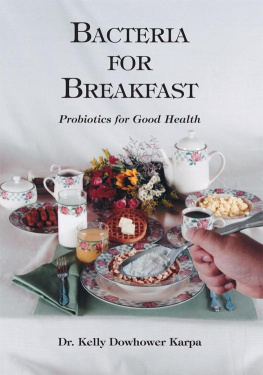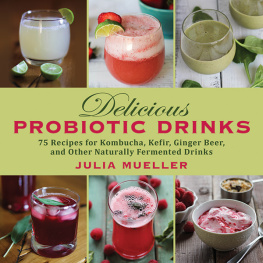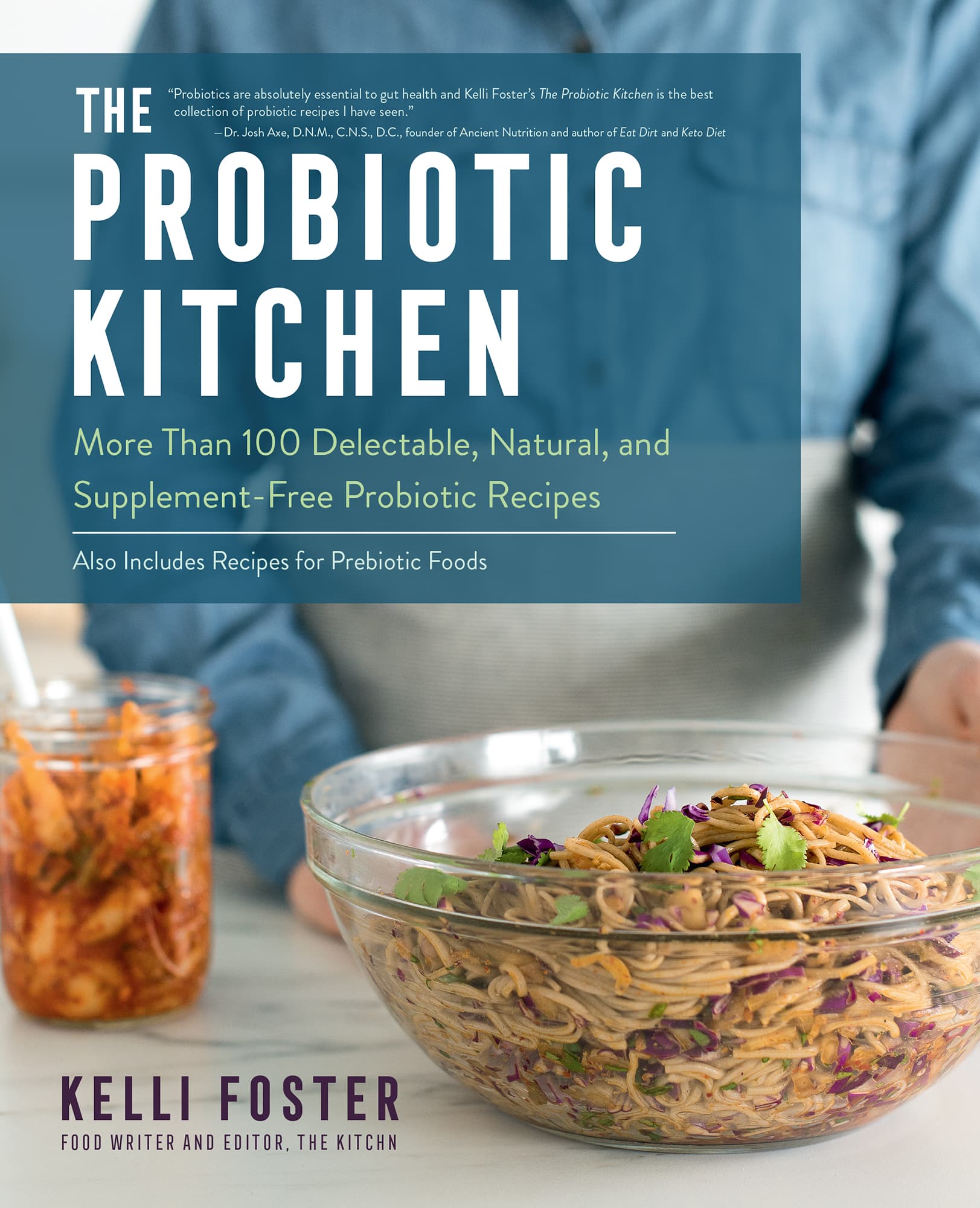THE PROBIOTIC KITCHEN

More Than 100 Delectable, Natural, and Supplement-Free Probiotic and Prebiotic Recipes

KELLI FOSTER

INTRODUCTION
The Probiotic Life

R ecently, as I ate a Buddha bowl for lunch, thrown together with a mess of ingredients in an effort to clean out my fridge at the end of the week, I noticed that nearly all the ingredientsmiso paste, scallions, avocado, fermented vegetables, and Greek yogurtcontained either probiotics or prebiotics. For the first time, it dawned on me that Ive been unintentionally (but regularly) including these gut-friendly foods in my diet, long before I knew about the benefits of probiotics and before I even knew that prebiotics were something to know about. I realized that, beyond the Buddha bowls I frequently eat for lunch or dinner, between yogurt bowls, smoothies, sauces, dressings, snacks, and fermented kraut I add to just about everything, I was incorporating a variety of natural probiotic foods into my diet pretty consistently. Turns out it was easy, and I wasnt launching into any DIY home fermenting projects or taking supplements to add more probiotics to my diet.
And you know what? Theres a good chance the same is true for you.
The reason Im so sure is simple. Its because probiotics (and prebiotics) are a natural component of so many common and readily available foods and even drinks. Sure, there are supplements aplenty these days, but they are far from the only way to get your probiotics. There is such an array of wholesome foods to choose from at your local grocer or farmers market that already come loaded with probiotic benefits. And better yet, there are so many interesting and delicious ways to easily work these probiotic foods into your diet as meals and snacks.
This cookbook is all about showing you just how easy it is to incorporate naturally probiotic-rich foods into your everyday diet. And, like I said, you may already be eating them without even knowing it, which puts you one step ahead of the game! The heart and soul of this book centers around widely available foods that contain probiotics and prebiotics made into more than a hundred approachable, healthy recipes to turn the natural probiotic foods you purchase, like yogurt, kimchi, and miso paste, into meals from breakfast through dinner and even dessert.
Lets get started!
What Are Probiotics and What Do They Do for You?
Without getting too much into the science (because were all eager to get cooking), probiotics are living microorganismssometimes referred to as good bacteriathat have health benefits, particularly in maintaining a healthy gut and digestive system. (Certain types of yeasts, which are not bacteria, also deliver probiotic benefits.)
Thats right, not all bacteria (also known as gut flora in the digestive system) are bad. Probiotics work to rebalance the good bacteria in your gut, keeping the bad bacteria in check and thus contributing to your digestive health.
Probiotics have been touted for doing everything from maintaining and improving digestive function to helping cure digestive ailments, offering immune benefits, reducing inflammation, and so much more. And while theres been extensive research recently into all the many ways probiotics can improve our overall health and a long list of benefits they can offer, it seems weve only just scratched the surfacetheres still a lot of research left to be done. But one thing we know for sure, which Ive experienced firsthand, is that probiotics help to maintain good digestive health.
Not only do you want to eat more foods that contain natural probiotics, but its important to eat a variety of these foods. There are various classifications of probiotics, and theyre not all created equal. Different species and strains offer different potential benefits, so to make sure youre taking advantage of many of these benefits, rather than just one or two, its helpful to introduce an array of natural gut-friendly foods to your diet. Thats what this book is for.
What Probiotics Will Not Do for You
While probiotics come with a host of health benefits, they are by no means a cure-all or a one-size-fits-all solution. You are also not likely to see their benefits instantaneously or from a single use. This is a marathon, not a sprint, and to really feel the good effects of ingesting probiotics, you want to gradually make them a regular part of your diet.
The exact benefits of probiotics can also vary from person to person. Think of your gut flora as an internal fingerprint. Everyones is different, and yours is totally unique to you, so probiotics can have different effects for different people. Because our gut flora arent identical, each of us is likely to experience a slight variation in the benefits of probiotics and how quickly we see them.
Remember, research around probiotics is still in the early days as far as learning all the ways probiotics will have an impact on our overall health and wellness.
Probiotics Naturally: All the Foods That Are Probiotic
Eating natural probiotic foods is far from a new trend. Probiotics are naturally found in all different foods, and cultures around the world have been consuming probiotic-rich fermented foods for thousands of years.
My favorite way to incorporate probiotics into my daily routine is with wholesome real foods, both because it feels the most natural and because its extremely easy. While its true that dietary supplements will give you the highest dose of probiotics, there is also a variety of nutritious foodssuch as kefir, kombucha, miso paste, tempeh, and yogurt, to name a fewthat contain natural probiotics, among a host of other healthful benefits.
Chances are youre already eating some of them and didnt know they were probiotic. To be sure youre at the top of your gut-health game, read the label with the list of ingredients on natural probiotic foods. Youre on the lookout for the term live active cultures (or live and active cultures). This is your cue that a food contains probiotics and that cultures were added after pasteurization. You might even see a list of the cultures that are included right there on the label. There are some foods, particularly dairy items, that are pasteurized after the cultures are added, thus killing off the bacteria and the gut-health benefits.
While you will find a great selection of naturally probiotic-rich foods at grocery and health food stores, another good place to source them is at farmers markets. There youll find small-batch producers with interesting items, including different types of fermented kraut and vegetables, local yogurts and kefir, and perhaps even cheese, that youre not as likely to find from commercial brands. In , well take a walk though the most common foods that naturally contain probiotics, which will serve as a great primer for the recipes ahead.











